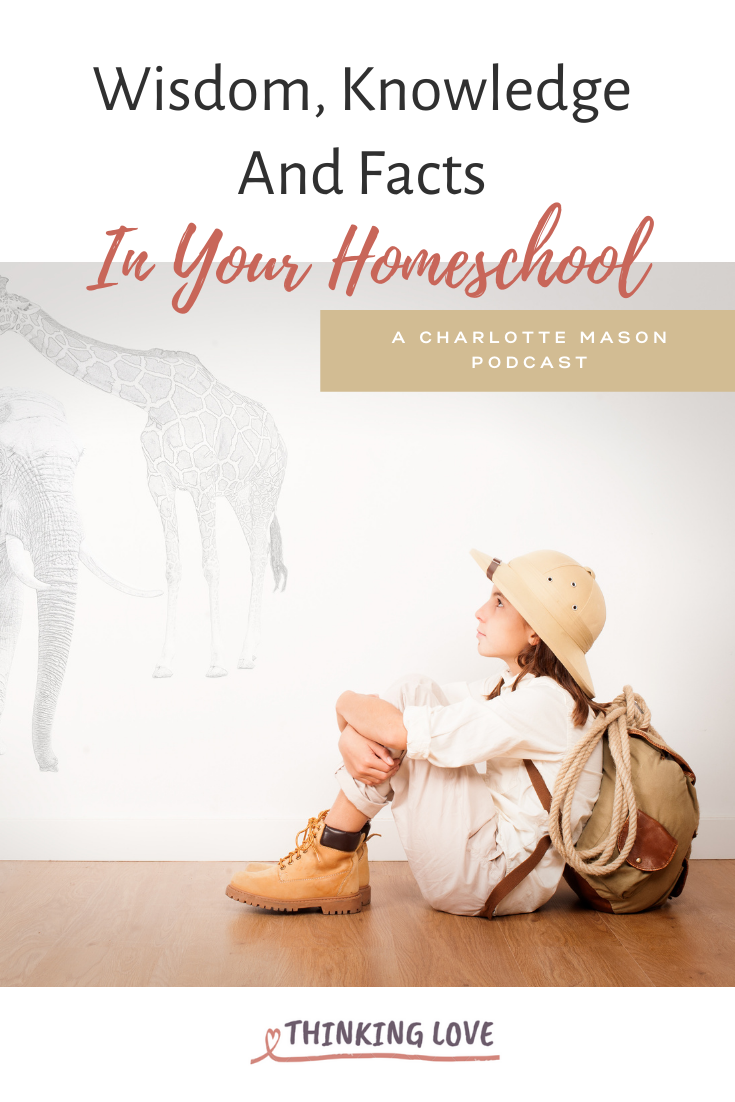In our "wisdom" season, we're discussing things related to wisdom and how that fits in with a Charlotte Mason education. Today we're focusing on knowledge, one of the building blocks of wisdom.

The contention of scholars is, that a classical education does more, turns out men with intellects cultivated and trained, who are awake to every refinement of thought, and yet ready for action. But the press and hurry of our times and the clamour for useful knowledge are driving classical culture out of the field; and parents will have to make up their minds, not only that they must supplement the moral training of the school, but must supply the intellectual culture, without which knowledge may be power, but is not pleasure, nor the means of pleasure. Formation of Character, pages 213-214
2:00- What is the modern, not Charlotte Mason way of seeing knowledge?
2:25- Knowledge as a way to solve problems and minimize inconveniences.
4:40- People look at a book and say they don't get the point of it, there weren't as many facts in it as they thought there should be... this sheds some lights on people's views of knowledge. Facts seem dry and isolated, but some people translate them into learning. But books can inspire us and make us think in a new and beautiful way, and that can be beautiful, pleasurable knowledge.
6:48- Charlotte Mason's take on knowledge was very non-utilitarian. Knowledge must be a source of vitality.
7:21- Math- we don't study it for a career or to improve critical thinking skills.
8:22- Formation of Character-
“To attempt a list of books suitable for the family lecture would be as hopeless as it is unnecessary; but it is possible to discuss the principles on which the selection should be made. In the first place, to get information is not the object of the family reading, but to make the young people acquainted with the flavour of, to give them a taste for a real "book"––that is, roughly speaking, a work of so much literary merit, that it should be read and valued for the sake of that alone, whatever its subject-matter.” page 222
9:28- Let's not dig too much into living books today, but I do want to talk about how we use those books in our lessons. During
10:56- Parents' Review article from Charlotte Mason Poetry- "Knowledge vs. Information"
“There is no doubt about it: children do want to know. They are infinitely curious until we kill their curiosity in school. The teachers have been amazed at the enthusiasm with which they concentrate upon the work in hand, and at the range of vocabulary and the power of expression which are developed by wide reading and the practice of narrating what they have read. For these children are not questioned by the teacher: they question themselves. ‘As knowledge is not assimilated until it is reproduced,’ says Miss Mason, ‘children should “tell back” after a single reading or hearing, or should write some part of what they have read.’” The Parents’ Review
13:02- Why do you think these beautiful, living books help children develop thinking skills?
14:26- I can think of a lot of reasons to use narration and living books! Illusion of competence.
18:49- Charlotte Mason believed that children need a certain amount of self-knowledge. Telling our children about this illusion of competence is important for this self-knowledge.
19:56- How do knowledge and wisdom tie together? C.S Lewis on reasoning, wisdom, and discernment in Why I Am Not a Pacifist.
24:31- It's really important that we're tuned into the right things when we discern what is right and wrong. Part of our job as home educators is to give our kids lots of materials to work upon so that they have lots of examples of right and wrong, true and false, okay or not okay.
26:11- The ideas that we give our children are going to inform their reasoning and even their wisdom.

